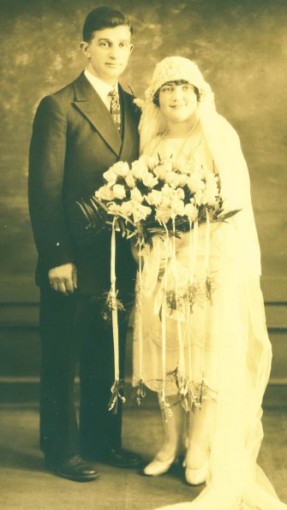Dad, what were you thinking and how were you feeling when you left your little shtetl of Shershov in 1921 and set out alone for the United States? At the age of 23, what made you go? Hunger? War? Pogroms? Poverty?
That’s how I began my September 14, 2015, blog post Questions for My Father. As a late child, born in 1946, I never got to have an adult conversation with my father, who died five days after his 60th birthday, when I was 11. What drove him from his shtetl (Jewish village), his parents, his brother and sister, and everything he had ever known? Where did he find the strength, at the age of 23, to start over in a new nation? Once in the United States, why did he change his name from Yankel Yussel Pinsky to Jack Pine?

Via genealogical research and the help of relatives, I had learned much about the history of Shershov (now part of Belarus and spelled Szereszow) and my uncle and aunt from around 1925 through the Second World War. My Uncle Leibel and Aunt Chashke each married and had children. All of them, of course, were killed, along with almost all the other Jews of Shershov, in 1942 and 1943. The Nazis shot many of them in 1942, and then in 1943 transported the rest to the Auschwitz- Birkenau death camp.
But until last week I knew almost nothing about my father’s parents, Shalom and Michla. I still know nothing about Michla, but what I leaned about Shalom helps me understand why my father left.
The area around Shershov was one of those places fated to go from one occupying force to another. Poland, Russia (or the USSR), and Germany trampled over it as though it were a rugby field. In 1914, the First World War’s Eastern Front passed through Shersov, taking it from Polish to German hands, and the German occupation was severe. The occupiers burned down most of the town, which led to a typhoid epidemic and famine as most of the foodstuffs were requisitioned for the German troops.
The following description of Shershov during the 1914-15 period, written in 1935, contains one of the few mentions I have ever seen of my grandfather, with his last name here spelled Pinski:
Study houses were transformed into hospitals and theaters. The casualties of the war were treated there…. Elderly people were driven into the bath-house where, with cold, cynical brutality their beards were shaved…. The brutality reached its climax when Reb Avrom Velvl, the melamed (teacher…), Reb Shalom Pinski and other old, infirm Jews were put in harness and used to plow the gardens. Various vegetables were needed for the occupying forces….
I came across that passage last week as I was looking through resource material without a hint that I’d find a mention of a man I had wondered so much about, my father’s father. In my family tree, I estimate his birth year as 1854, and I suspect that he had died by the mid 1920’s. So he was in his early 60’s when harnessed and turned into a human beast of burden for the German Empire. And his youngest child, my father, was 16 or 17.
Perhaps neither Shalom nor Michla lived to see their son Yankel (my father Jack) leave the shtetl in 1921, but that one passage taught me much about how he found the courage to make his way to a new land that offered a new opportunity for immigrants.
May all who need it find an opportunity as he did.
— Mel Pine (Urgyen Jigme)
Copyright 2017 © Mel Harkrader Pine

Thanks you fro sharing this story and the wonderfull video clip of Leanard Cohen.
LikeLiked by 1 person
This touched me deeply. It is very bitter sweet. Thank you for sharing.
LikeLiked by 1 person